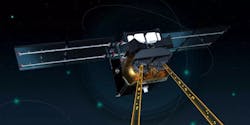Exploring quantum-safe networking: Honeywell, Colt, and Nokia trial satellite-based encryption
Questions and answers:
What is the main technology being tested in the trial? The companies plan to trial quantum key distribution (QKD), a secure method for sharing encryption keys, using low Earth orbit satellites to support long-distance and transatlantic communications.
Why is quantum-safe networking important? Quantum computers are expected to break traditional encryption methods, potentially exposing sensitive data. The project aims to build defenses against that threat before it becomes a reality.
Which industries could benefit from this initiative? Organizations in finance, healthcare, pharmaceuticals, and government that manage large volumes of sensitive information are expected to benefit most from quantum-resilient communications.
LONDON - Colt Technology Services in London, Honeywell in Phoenix, and Nokia in Espoo, Finland, are partnering to explore quantum-safe networking using satellite communications in a joint effort to protect sensitive data from future cybersecurity threats posed by quantum computing.
The companies are collaborating to trial advanced cryptographic technologies that could secure optical network traffic beyond the reach of today’s conventional encryption.
The companies plan to test quantum key distribution, or QKD, a method that securely shares encryption keys between two parties by using the principles of quantum mechanics. QKD is seen as a key step toward protecting critical communications in a future where quantum computers could easily break traditional encryption algorithms.
Longer ranges
Current QKD implementations are limited to short distances - typically around 100 kilometers - due to the physical constraints of terrestrial fiber networks. To extend coverage globally, the collaboration will examine the feasibility of satellite-based and subsea QKD systems. Trials will involve the use of low Earth orbit satellites to enable ultra-long-distance and transatlantic encryption key exchanges.
This type of networking resilience is especially important for sectors handling highly sensitive information, including financial services, healthcare and pharmaceutical organizations, and government agencies.
The collaboration also aligns with broader industry efforts to prepare digital infrastructure for the quantum era. While quantum computing has the potential to solve complex problems, it also presents a looming risk to conventional data protection methods. Experts warn that encrypted data stolen today could be stored and later decrypted once quantum systems become powerful enough - a concept known as "harvest now, decrypt later."
Ahead of the trial, the three companies have co-authored a white paper, The Journey to Quantum-Safe Networking, which outlines technical challenges, emerging risks, and potential mitigation strategies associated with quantum computing. The paper is available for download through Colt’s website.
About the Author
Jamie Whitney
Senior Editor
Jamie Whitney joined the staff of Military & Aerospace Electronics in 2018 and oversees editorial content and produces news and features for Military & Aerospace Electronics, attends industry events, produces Webcasts, and oversees print production of Military & Aerospace Electronics.
